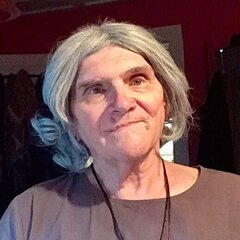-
Who's Online 5 Members, 0 Anonymous, 117 Guests (See full list)
- Betty K
- Ivy
- VickySGV
- April Marie
- Maddee
-
Recently Browsing 0 members
- No registered users viewing this page.
-
Forum Statistics
-
Total Topics80.7k
-
Total Posts769.3k
-
-
Member Statistics
-
Total Members12,058
-
Most Online8,356
Newest Member
Aleksandria
Joined -
-
Today's Birthdays
-
Conner_Sent_By_Cyberlife
(22 years old) -
CtN1p
-
heyim_finn
(21 years old) -
Jayn
-
joni_girl_1988
(51 years old)
-
-
Posts
-

By Betty K · Posted
Yes, essentially. As Julia Serano says, they view trans outcomes as intrinsically worse than cis outcomes. -

By Jani · Posted
I used to but now its just lip gloss every now and then, in a subdued tone. -

By Ivy · Posted
Yeah, a lot of times I don't really have anything to add to the conversation. There are some threads I seldom post on. -

By Ivy · Posted
I have seen some things about this. As I remember it was not very trans-friendly. The people doing these things seem to minimize the positive aspects of transition, and maximize the potential problems. Basically, make it as difficult as possible (without outright banning it) to discourage anyone from doing it. -

By Willow · Posted
Good morning woke up to some light rain this morning. Maybe I should run out with a giant umbrella to cover the car. Ha ha ha. I’ve had really nice cars before but never something like this. @KymmieL I hope you got to go on your ride. Back when I had my Harley we went out for a ride almost every weekend. We would head either SW down the Shenandoah Valley or Skyline Drive which danced along the tops of the Mountains or we would head west into West Virginia and just travel along until it was time to find our way home. occasionally I wish I still had a bike but I usually quickly for get that. The only thing I ever wanted as a young person that I never had was a late 50s vette. -

By April Marie · Posted
I admit to wearing make-up. Actually, I'll admit to enjoying wearing make-up. For me, it's been part of learning about myself as a woman and finding a style and look that reflects my personality. Sometimes, it will just be a bit of mascara and a touch of lipstick. But, most often I wear foundation with setting powder, gel eyeliner, mascara, a little blush on my cheek line and lipstick. I also use an eyebrow pencil to darken my brows a bit. Infrequently, I will add some eye shadow. Most of my make-up is from Mary Kay although my lipsticks or from various manufacturers and eyeliners are mostly Maybelline. My wife purchases most of her make-up from Mary Kay and so we order together from our local representative. Of course, I don't have much brand experience but I'm happy with the Mary Kay products and find myself transitioning almost entirely to their line of make-up. -

By KathyLauren · Posted
I did early on, out of necessity. Regardless of how close you shave, beard shadow shows through. I just used a bit of foundation, setting powder and blush. I didn't use much eye makeup. I started out with a bit of eye liner, but I thought it gave me a "trying too hard" look. So I mostly didn't use any. With covid and masking, I stopped using makeup altogether. Why bother when no one can see your face and the mask smears the makeup anyway? When restrictions were lifted, I didn't go back to wearing makeup. My face feminized quite nicely over the first few years of HRT. I'll never be pretty, but I look more female than male. (Or I like to tell myself that anyway.) With several years of electrolysis, and with what facial hair remains turning white, I don't have much beard shadow, so there is nothing to cover up. -
-
By Heather Shay · Posted
Do you use make-up? If so, why and what types? -
By Heather Shay · Posted
Pride is primarily about yourself, even when it is not you who did something that you are proud about. You can also be proud of something someone else did, who you associate with, such as your children or your favorite football team. People can feel proud of their culture, their family name, or their appearance, none of which require them to actively contribute to the praiseworthy thing1. However, the opinions of others are of crucial importance, as best demonstrated when you purposefully do something that other people praise. Pride is a social emotion, and to feel proud, you need other people’s (real or imagined) confirmation that you have a reason to feel that way. Because of this, other people can also ‘be in your head’ and prevent you from feeling pride. Namely, what is praiseworthy is subjective. Things that may be considered good in a certain (cultural) group may not be praiseworthy in another (e.g., if you grew up in a family that greatly values academics, your athletic abilities may not evoke much praise). Moreover, what is praiseworthy is relative (e.g., if you are a good runner in an athletically average school, you may regularly feel proud about your times; but if you move to a school with highly competent athletes, these same times may seem unremarkable to you). Thus, the more exclusive your quality is in your surroundings, the prouder you feel. Pride has recognizable features. Although its static facial expression (typically a smile or laugh) does not clearly distinguish it from other positive emotions, it typically results in a bodily posture, gestures, and behavior that are clearly recognizable: lifting your chin, looking people in the eye, walking confidently, or in extreme cases, raising arms above your head. In a way, you try to make yourself larger and more noticeable, as if to say: ‘look at me!’ You may also exhibit more perseverance in your activities2. People generally find it very pleasant to experience pride, as it elevates our feeling of social self-worth and status3. At the same time, many social groups, religions, and cultures (especially those that are highly collectivistic, such as the East Asian or African culture) believe that pride needs to be checked. Unchecked pride leads to arrogance and misplaced feelings of superiority (‘letting something get to your head’, ‘hubris comes before the fall’), and social groups typically do not tolerate members feeling like they are superior or deserve special treatment. -
-
-
-

By April Marie · Posted
Thank you @missyjo! You do wonders for my ego. It turns out that pastel colors were the "thing" at Kentucky Derby Day so my dress was perfect. I went with white 5" heeled sandals and a wide-brimmed fuscia hat. Dinner and Mint Juleps added to the fun of watching the (recorded) festivities and races. Perhaps, we'll repeat it for the Preakness in 2 weeks. Right now it's just blue striped sleep shorts with pink flowers, a pink t-shirt and flip flops. I can't tell you how much wearing sleep-rated breast forms at night has done to quell my dysphoria. -

-
-
Upcoming Events
-

Recommended Posts
Create an account or sign in to comment
You need to be a member in order to leave a comment
Create an account
Sign up for a new account in our community. It's easy!
Register a new accountSign in
Already have an account? Sign in here.
Sign In Now